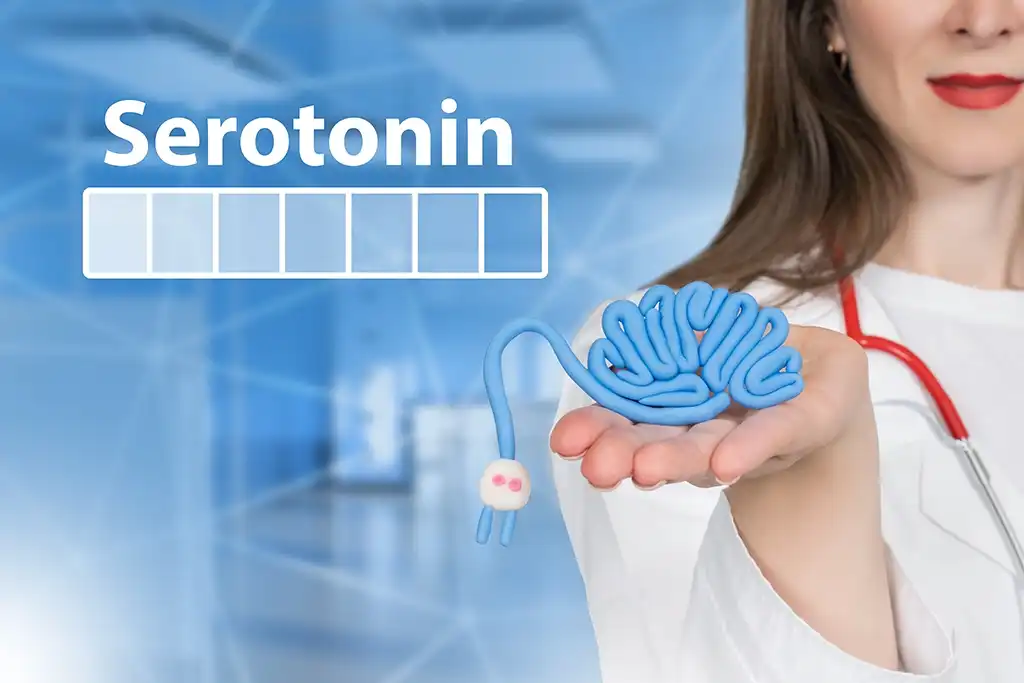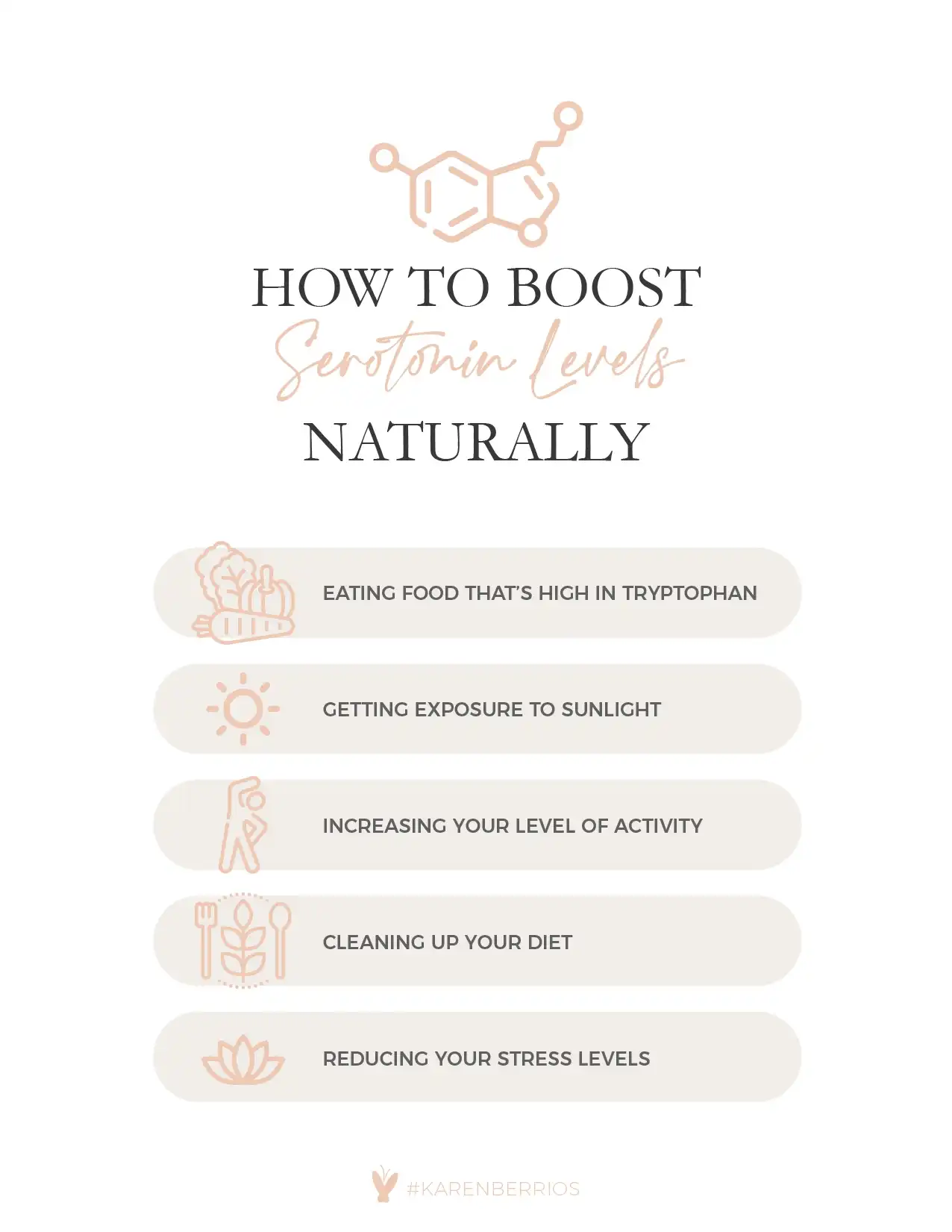

Serotonin Why You Need It and How to Boost Levels Naturally
Serotonin Why You Need. High levels of serotonin are often associated with feeling happy, positive, and overall well. Why is this feel-good chemical so important, how does it affect the quality of our lives, and most importantly, what can we do to boost serotonin levels the natural way?
What is Serotonin?
Serotonin is a chemical that’s responsible for carrying out information between your brain and the rest of your body. It plays a crucial role in almost every function of your body, from sleep and digestion to bone health and stress management.
In more medical terms, it’s also called 5-hydroxytryptamine (5-HT), a neurotransmitter that ensures the communication between your cells is optimal. It’s made out of tryptophan, an essential amino acid that cannot be made by the human body and, therefore, has to be obtained through food. The majority of serotonin is found in your gut, and that’s where the infamous gut-to-brain connection theory comes from.
Gut-to-Brain Connection
Also known as the gut-brain axis, this communication pathway is bi-directional. This means that the gut microbiome can affect the levels of serotonin and vice-versa. That’s why the gut is often called the “second brain.” The incredible enteric nervous system (ENS) and its two thin layers contain over 100 million nerve cells that line your gastrointestinal tract from the esophagus to the rectum.
Low levels of serotonin have shown a negative effect on the gut microbiome, causing everything from poor digestion and a slow metabolism to anxiety and depression.
The Role of Serotonin in The Human Body
It’s almost impossible to imagine an area of the human body that doesn’t involve serotonin, but here are some of the most important functions that require its optimal levels:
-
- Mood: Also called the feel-good chemical, high levels of serotonin make you feel good, keep your mood elevated, and lower the risk of depression and anxiety.
- Digestion: Serotonin in your intestines helps maintain good bowel movements, nutrient absorption, and toxin disposal. This chemical can also play a big part in reducing your appetite while eating. As a matter of fact, low levels of serotonin have been linked to overeating and emotional (or stress) eating.
- Bone health: When levels of serotonin in the brain are within their normal levels, they have a positive effect on bone formation and density.
- Wound healing: The platelets in your blood produce serotonin in order to help heal wounds. Additionally, serotonin helps blood clot, which reduces the risk of bleeding.
- Sleep quality: Serotonin plays a huge role in your sleep. Not only does your brain need serotonin to create an important hormone, melatonin, which induces sleep, but it also impacts your sleep duration and overall quality.
- Sexual health: Studies show that serotonin plays a role in your libido. High levels aren’t necessarily linked to a high libido, and vice-versa, and that’s why managing your levels and understanding how your body works is crucial for improving your sexual health.
Low Levels of Serotonin
Low levels of serotonin are oftentimes associated with a variety of health conditions, from anxiety and depression to sleep problems, panic disorders, schizophrenia, and more. Whether the cause of low serotonin is simply your body’s inability to produce serotonin or not knowing how to efficiently use it, the result is the same: dysfunction and health issues.
How to Increase Serotonin Levels Naturally?
Although there are medically approved ways of increasing serotonin levels, such as certain medications (Selective Serotonin Reuptake Inhibitors or SSRIs, also known as antidepressants) and supplements (St. John’s Wort, S-Adenosyl-L-Methionine), the best way to tackle your serotonin production is through natural boosters. Here are some of the most efficient ways to increase serotonin levels.
Eating food that’s high in the amino acid tryptophan – tryptophan-rich foods typically come from animal sources, such as eggs, fatty fish, and lean meats. Still, there are some plant-based sources of tryptophan, such as nuts, pumpkin seeds, beans, chickpeas, oats, and raw cacao powder.
Getting exposure to sunlight – levels of vitamin D and levels of serotonin are closely connected. When one is deficient, the other one tends to be as well. Since the best way to increase vitamin D production is by being exposed to sunlight, try spending more time outdoors. However, ensure you’re staying protected from the sun’s damaging UV rays with a high-quality SPF. If you’re living in an area where sunlight is scarce, consider light therapy to boost your levels of both, vitamin D and serotonin.
Increasing your level of activity – sedentary lifestyles are often connected to low levels of serotonin and higher levels of anxiety and depression. Exercise tends to naturally boost serotonin levels, helping you feel better physically as well as mentally.
Cleaning up your diet – Unhealthy foods that are overprocessed and filled with artificial ingredients are often causing inflammation in your body. This, in turn, can dramatically lower your serotonin levels, increasing your risk of poor gut microbiome, mood disorders, slow digestion, low-quality sleep, and mental health issues.
Reducing your stress levels – stress is known as the silent killer because it affects absolutely every function in your body, most of the time in the background of your day-to-day life. Low levels of serotonin are caused by high stress, especially when it becomes chronic. Implement habits that will lower your stress levels, such as meditation, mindfulness, journaling, and tech detox.
Can You Have Too Much Serotonin?
Low levels of serotonin are linked to a variety of health issues, but is there such a thing as having too much serotonin? Also known as the serotonin syndrome or serotonin toxicity, extremely high levels of serotonin can be dangerous and even life-threatening. It’s impossible to occur on its own and it has to be drug-induced. Therefore, it’s crucial to follow the recommendations and guidelines from a medical professional if you’re ever prescribed for your, typically mental health condition.
Final Thoughts
Serotonin is an essential chemical that does more than just make you feel good. Low levels are often associated with a vast number of dysfunctions in the human body, and it’s extremely important to keep its levels within normal range. Focus on natural ways to increase and maintain good serotonin levels for your overall health and longevity.

hey there
I'm Karen!
I have found my cancer journey to be a positive and profound transformational experience. I’m inspired to share my healing journey here, and trust you’ll find hope, encouragement and purpose as you discover the healing power that lies within you.
Join
The Mailing List!
By signing up for my newsletter, you agree with our Privacy Policy and Terms & Conditions.



